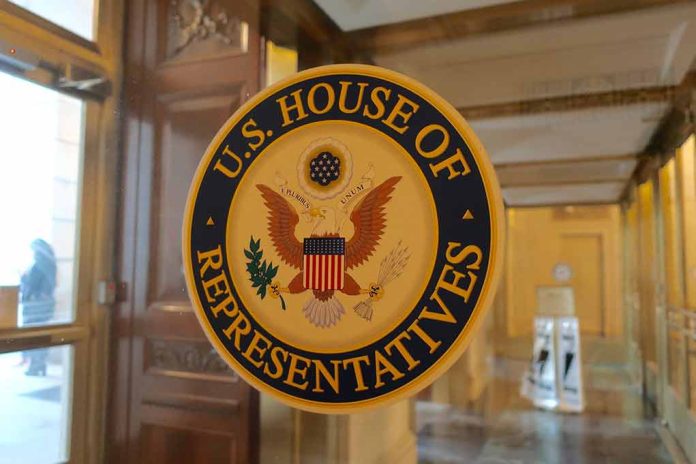
The House of Representatives has passed the HALT Fentanyl Act, a crucial step in combating the deadly fentanyl crisis, but the bill now faces a challenging Senate vote.
Key Takeaways
- The HALT Fentanyl Act passed the House with bipartisan support, reclassifying fentanyl as a Schedule I drug.
- The bill aims to close the “analogues loophole” and empower law enforcement against fentanyl producers and distributors.
- In 2023, nearly 70% of over 107,000 overdose deaths in the U.S. involved synthetic opioids like fentanyl.
- The legislation now moves to the Senate, where it needs 60 votes to progress further.
- Critics argue the bill could increase prison populations without effectively reducing overdose deaths.
House Passes HALT Fentanyl Act with Strong Bipartisan Support
The U.S. House of Representatives has taken a significant step in the fight against the fentanyl crisis by passing the HALT Fentanyl Act with a 312-108 vote. This crucial legislation aims to permanently classify fentanyl analogs as Schedule I substances, placing them in the same category as heroin and LSD. The bill received strong bipartisan backing, with 98 Democrats joining 214 Republicans in support of the measure.
The HALT Fentanyl Act is designed to close the “analogues loophole,” which has allowed drug traffickers to evade restrictions by slightly altering fentanyl’s chemical structure. By empowering law enforcement to target producers and distributors of fentanyl and its analogs, the legislation aims to curb the alarming rise in overdose deaths across the nation.
Do you see the number of Democrats who voted no on the HALT Fentanyl Act.
This should tell you everything you need to know about the Democratic Party. pic.twitter.com/p2LjXwccWF
— Mark of the BEAST (@MarkOftheBEAS14) February 6, 2025
Urgent Response to a Growing Crisis
The urgency of this legislation is underscored by the staggering statistics surrounding fentanyl-related deaths in the United States. According to the Drug Enforcement Administration’s 2024 National Drug Threat Assessment, fentanyl remains the primary driver of the ongoing epidemic of drug poisoning deaths in the country.
In 2023 alone, synthetic opioids, primarily fentanyl, were responsible for nearly 70% of the more than 107,000 overdose deaths reported in the United States. This alarming trend has made fentanyl overdose the leading cause of death among U.S. citizens aged 18-45, highlighting the critical need for immediate and decisive action.
Bipartisan Support and Potential Impact
The bipartisan nature of the HALT Fentanyl Act’s passage in the House demonstrates the widespread recognition of the fentanyl crisis as a national emergency. Supporters of the bill argue that it will provide law enforcement with essential tools to combat the production and distribution of fentanyl and its analogs, potentially saving countless lives.
The legislation also allows for medical research on fentanyl analogs and does not hinder the medical use of fentanyl when necessary, addressing concerns about potential impacts on legitimate medical practices.
Challenges Ahead in the Senate
Despite its strong showing in the House, the HALT Fentanyl Act now faces a contentious battle in the Senate. The bill requires 60 votes to overcome potential filibusters and advance, a threshold that may prove challenging given past opposition from some Democrats. Critics of the legislation argue that it could lead to an increase in domestic prison populations without effectively reducing overdose deaths.
As the March 31 expiration date for the temporary Schedule I classification of fentanyl analogs approaches, the pressure is mounting for the Senate to act swiftly. Supporters of the bill are calling for bipartisan cooperation to ensure its passage, emphasizing the potential for the HALT Fentanyl Act to save lives and prevent future tragedies.
Sources:
House passes bill elevating fentanyl to Schedule I drug — joining heroin, LSD and marijuana
The HALT Fentanyl Act gives Americans hope
House Passes HALT Fentanyl Act Amid Trump’s Drug Trafficking Crackdown







